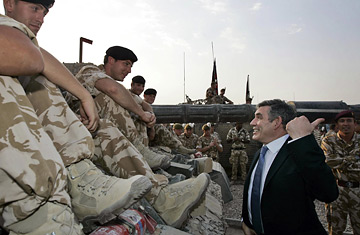
Gordon Brown jokes with British troops at their base in the southern Iraqi city of Basra.
Iraq sank Tony Blair, and now it's dealt a heavy blow to his successor, Gordon Brown. The Labour Prime Minister made a surprise visit to the country on Oct. 2 and announced a draw down of 1,000 troops by the end of the year. That should have been a popular move. After all, opinion polls show most Britons believe the U.K. should extricate itself from Iraq as soon as possible. Instead, Brown came under fire from political opponents, media critics and even some in his own party. They accused him of using the trip for grandstanding — Brown had previously promised any announcements on such matters would be made in the House of Commons — and they pointed out that some of the troops included in his headline-grabbing figure had already returned home. Brown denied he used the trip just to score political points. He was planning a much more detailed announcement to parliament, he said, and would have been criticized for not visiting Iraq before he did so.
But the damage had been done, and much of the momentum Brown enjoyed since taking office in June has now been lost. The controversy helped to boost the already resurgent Tories, whose rise only intensified when Brown shied away from an expected November election earlier this week. Brown, who in Iraq had praised "the great courage, professionalism and bravery" of British troops stationed there, has found himself accused of cowardice by the increasingly confident Tories for avoiding an open election fight.
Brown delivered his promised announcement on Iraqi troop levels on Oct. 8, the day MPs finally returned to work after a long recess. The green benches of the Commons, often sparsely populated, were crammed, with well-upholstered MPs spilling into each others laps and those too slow to claim their seats forced to stand to listen to Brown's plans. "Let me affirm," Brown told them, "as I told [Iraqi] Prime Minister Maliki last week, and as I have agreed with President Bush and our other allies, we will meet our obligations, honor our commitments and discharge our duties to the international community and to the people of Iraq."
There are currently about 5,000 U.K. troops in Iraq. Brown's statement envisages this will fall to 4,500 by December and to 4,000 by early in the new year, as the British military moves into what he described as a two-stage overwatch process. During the first stage, U.K. forces are expected to retain responsibility for training, securing supply routes and helping to patrol the Iran-Iraq border, while 500 support and logistics personnel will operate from a neighboring country. A further draw down in the spring should see troop levels cut to 2,500 and signal a second stage of overwatch, with British forces largely focused on mentoring the Iraqi armed services. In April, there is to be a wholesale review, which could conceivably pave the way to a complete withdrawal of troops. A government official confirms "there is no guarantee [U.K. forces] will be [in Iraq] beyond the end of 2008."
Brown is set to meet U.S. Secretary of Defense Robert Gates. Downing Street sources insist that Washington is in agreement with the rapid draw down, but some U.S. critics have questioned Britain's record in Iraq. General Jack Keane, a Pentagon envoy to Iraq, told the BBC in August that "the Brits have never had enough troops to truly protect the population."
When the going got tough for Blair at home, he was always assured a warm welcome in Washington. As Brown for the first time in his brief premiership feels the sting of public disapproval, he'll find little solace across the Atlantic.
